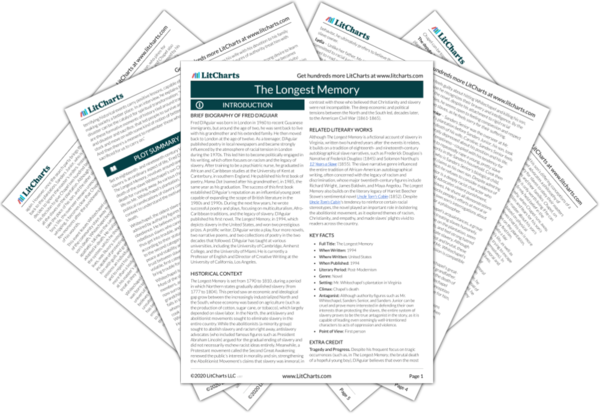Freedom vs. Obedience
The Longest Memory explores the horror of slavery through its dissection of life on a Virginia plantation in the early nineteenth century. Whitechapel, the oldest and most respected slave on the plantation, does not believe in his freedom, trusting instead that he should show subservience toward his master, Mr. Whitechapel, to protect his life. By contrast, Whitechapel’s son, Chapel, wants to fight for liberation. When Chapel escapes from the plantation, Whitechapel is…
read analysis of Freedom vs. ObedienceRacism and Inequality
While some characters in The Longest Memory, such as Lydia and Chapel, argue that blacks should be granted the same rights as whites, most of eighteenth- and nineteenth-century Virginian society proves hostile to the concept of equality, preferring instead to believe that blacks are inherently inferior. Racism determines the nature of economic and social relations between whites and blacks. Such entrenched inequality sets a fragile foundation for the nation’s present and future, as…
read analysis of Racism and InequalityPunishment and Cruelty
Plantation owners’ management of their estate is based on an analysis of costs and benefits, meant to protect their self-interest over the well-being of their slaves. In order to govern over large groups of slaves, many masters resort to various kinds of punishment, aimed at discouraging rebellion or escape. Seemingly alone in believing in slaves’ humanity, Mr. Whitechapel argues for demonstrating kindness and respect to slaves in order to establish relationships of trust. However, Mr…
read analysis of Punishment and Cruelty
Love, Sex, and Family
While love can blossom on Southern plantations, relationships formed in the midst of slavery are inherently fragile, threatened by the external dangers of a racist society. The taboo nature of interracial relationships keeps lovers (such as Lydia and Chapel) from being together, and the lack of consideration for black people’s lives risks tearing apart the family that Whitechapel and Cook have created. Despite these obstacles, it is precisely the possibility—however frail—of developing meaningful relationships…
read analysis of Love, Sex, and Family






